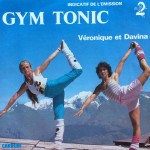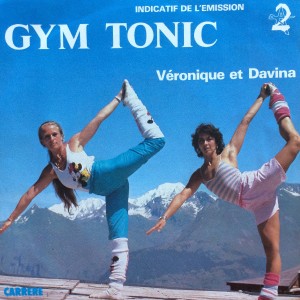
 Gym Tonic aerobics programme : the ausdio disc in the 80sThe Gym Tonic aerobics programme heralded the advent of a new politics of the female body
Gym Tonic aerobics programme : the ausdio disc in the 80sThe Gym Tonic aerobics programme heralded the advent of a new politics of the female body
The images accompanying the Gym Tonic programme are nothing new but in the early 80s, they were revolutionary in more ways than one, notably for their impact on the media and on women’s body image. Women’s magazines may well have, ever since the 19th century, regularly reconfigured female body norms (often in thrall to fashion’s dictates) but the 20th century mass media were about to radically change this pattern.
The idea that women might meet the female beauty ideal through sport practice gained traction at the beginning of the 20th century. Trade papers ran with the concept and accordingly propagated a new female body image. Whereupon respected educators such as Edmond Desbonnet or say Georges Hébert, both adepts of natural methods, set forth physical education classes in the shape of illustrated articles or books. As from the 50s, radio broadcasting joined in the physical education effort, thanks in particular to Robert Raynaud and his programme Réveil musculaire, aired on the station Paris Inter.
Thus, physical culture gradually inserted itself in families’ leisure activities. However, sport remained a minority interest among women until the late 60s, when the American physician Kenneth H Cooper launched aerobics. The term, drawn from the word aerobia is defined in Cooper’s book, titled The New Aerobics for women, in terms of the increase of oxygen required by a sustained effort over a long period of time. Now the exponents of this new practice were mostly women, notably Jane Fonda in the United States, who offered aerobics classes in her capacity as an actress.
In France the movement solidified around a program called Gym Tonic, which Antenne 2 broadcasted from 19 September 1982 to 29 June 1986. The programme was produced by Pascale Breugnot who set up Véronique De Villèle and Davina Delor as presenters, and as such made them aerobics’ ambassadors in France. To the accompaniment of sustained, dynamic rhythms, the presenters took on the teacher’s role while extras performed as students. The programme followed four stages: warm-up, workout, jogging and relaxation. With “sweat with a smile” as its guiding principle, Gym Tonic grew very popular in 1983-84 allowing for a diversity of themes and locations.
The practice and the programme qualify as political issues in more ways than one. First, they had an emancipatory effect on women: Gym Tonic can rightly be considered one moment marking women’s inroads into the mass media and also women’s reappropriation of the female body. Second, the programmes proved controversial: a number of professional sports figures hailing from official Sport federations questioned this new approach deemed dangerous, unsuited to the population as a whole and whose proponents were not qualified to teach. Some fractions of society supported these detractors’ critiques citing the real difficulty presented by a sport purported to be “open to all”. The programme was in fact set in the context of a new public policy intent on developing physical activity. In the late 70s, the government warned against a lack of physical activity suspected of bringing about such conditions as obesity, depression, heart diseases, so that the aerobics programmes fitted into a broader landscape of proliferating Health Days or Weeks. Lastly, the televised content made it possible to assign to everyone a role in attending to their health without medical involvement. Thus, the mass media played a major part in the dissemination of a new remote therapy hinging, so to speak, on a self-care approach.
Having enjoyed a massive following, popular aerobics brutally faded in France when the Gym Tonic programme stopped in 1986. This may be related to the 90s preference for calm and meditation as healthy good practice. With the noughties however, an aerobics come-back has been observed; now re-branded “fitness” and favouring new approaches with options for live group tuition or individual tuition via Youtube channels, as seen in Tibo InShape’ videos.
Follow the reading on the dictionnary : Caster Semenya- Tattoos
Références :
Corinne Airieau, Gym Tonic : Étude d’une société contemporaine au travers d’une émission télévisuelle de 1970 à 1986, Mémoire dirigé par Hervé Guillemain, Céline Borello, Le Mans Université, 2019.
Pierre Arnaud, Thierry Terret, Histoire du sport féminin, Tome 1, Le sport au féminin : histoire et identité, Paris, L’Harmattan, 1996.
To quote this paper : Corinne AIRIEAU, "Aérobics" in Hervé Guillemain (ed.), DicoPolHiS, Le Mans Université, 2021.